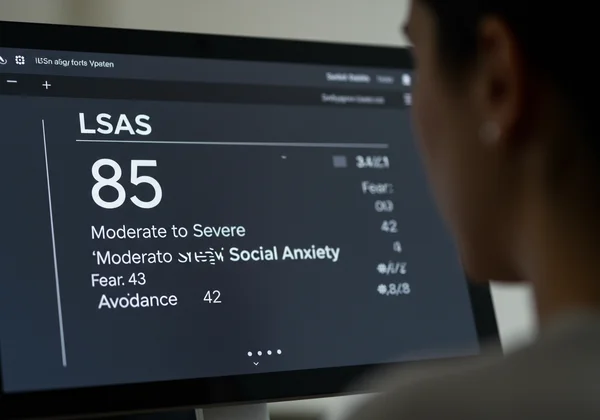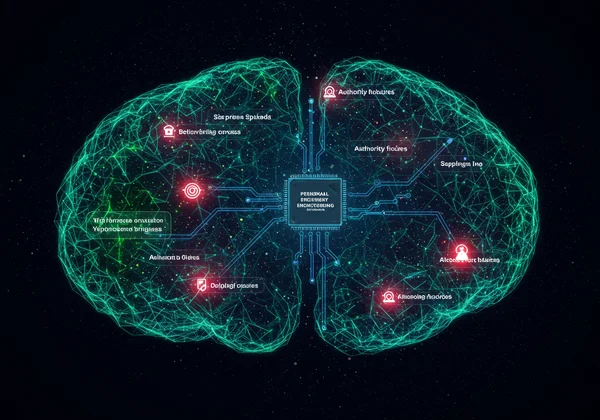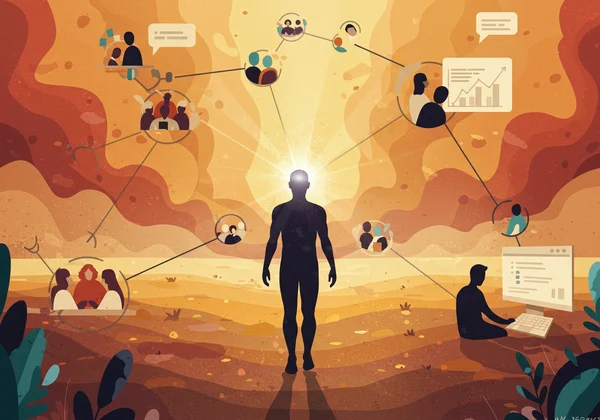Contoh Laporan AI LSAS: Melangkaui Skor dengan Kajian Kes
October 8, 2025 | By Elara Donovan
Memahami zon selesa sosial anda adalah satu perjalanan yang sangat peribadi. Anda mungkin pernah mengambil kuiz dalam talian sebelum ini, menerima skor yang melabelkan pengalaman anda. Tetapi selalunya, nombor itu terasa seperti titik akhir—sekadar label ringkas tanpa cerita. Tetapi apakah maksud skor LSAS bagi anda, secara peribadi? Di sinilah penilaian mudah bertukar menjadi alat yang berkuasa untuk penemuan diri.
Liebowitz Social Anxiety Scale (LSAS) ialah rangka kerja yang dihormati untuk menilai kebimbangan sosial. Di platform kami, kami menawarkan ujian LSAS percuma yang memberikan anda skor yang jelas dan segera. Walaupun skor ini adalah titik permulaan yang sangat baik, ia hanyalah puncak gunung ais. Pemahaman sebenar datang daripada meneroka nuansa di sebalik nombor itu. Itulah sebabnya kami membangunkan laporan analisis mendalam yang dikuasakan oleh AI. Artikel ini akan membimbing anda melalui contoh laporan AI LSAS menggunakan kajian kes untuk menunjukkan kepada anda bagaimana wawasan peribadi dapat mewujudkan laluan yang jelas ke arah pertumbuhan.
Memperkenalkan Alex: Sebuah Kajian Kes tentang Kebimbangan Sosial
Untuk menggambarkan kuasa analisis mendalam, mari kita temui Alex. Alex ialah watak fiksyen, tetapi ceritanya mencerminkan cabaran sebenar yang dihadapi oleh ramai pengguna kami. Dengan mengikuti perjalanan mereka, kita dapat melihat bagaimana melangkaui skor ringkas membuka tahap pemahaman baharu.
Skor LSAS Awal Alex: Gambaran Fobia Sosial
Alex ialah seorang profesional pemasaran berusia 28 tahun yang berbakat. Mereka kreatif dan rajin tetapi mendapati sesetengah aspek pekerjaan mereka amat menimbulkan tekanan. Mesyuarat pasukan, terutamanya apabila diminta memberikan pendapat secara tiba-tiba, menyebabkan jantung mereka berdebar kencang. Acara rangkaian terasa seperti menavigasi medan periuk api, dan fikiran untuk memberikan pembentangan utama boleh mencetuskan malam tanpa tidur.
Berasa ini lebih daripada sekadar rasa malu, Alex memutuskan untuk memulakan penilaian mereka. Selepas menjawab 24 soalan, mereka menerima keputusan mereka:
- Jumlah Skor LSAS: 85
- Subskor Ketakutan: 43
- Subskor Pengelakan: 42
Interpretasi standard menunjukkan tahap kebimbangan sosial yang sederhana hingga teruk. Skor tinggi dalam ketakutan dan pengelakan menunjukkan bahawa Alex bukan sahaja merasakan tekanan yang ketara dalam situasi sosial tetapi juga secara aktif berusaha untuk mengelakkannya. Ini mengesahkan perasaan Alex, tetapi ia juga meninggalkan mereka dengan satu persoalan penting: "Apa seterusnya?"

Perjalanan ke Wawasan Lebih Dalam: Mengapa Alex Memerlukan Lebih Daripada Sekadar Pemahaman Mendalam
Skor 85 adalah pengesahan, tetapi ia tidak memberikan panduan tindakan. Ia tidak menjelaskan mengapa Alex selesa makan tengah hari dengan seorang rakan sekerja tetapi gentar akan sesi sumbang saran pasukan. Ia tidak menawarkan jalan ke hadapan selain daripada nasihat umum "anda mengalami kebimbangan sosial." Alex memerlukan konteks.
Inilah jurang yang direka untuk diisi oleh laporan yang dikuasakan oleh AI. Ia mengambil 24 jawapan yang sama dan, dengan menganalisis corak di dalamnya, mencipta kisah peribadi. Alex memutuskan untuk membuka laporan mereka, mencari kejelasan yang tidak dapat diberikan oleh satu nombor.
Membongkar Laporan AI LSAS: Analisis Kebimbangan Peribadi
Apabila Alex membuka laporan AI mereka, mereka mendapati ia jauh lebih daripada sekadar tafsiran skor. Ia adalah pecahan terperinci landskap sosial unik mereka, lengkap dengan pencetus, kekuatan, dan impak dunia sebenar. Inilah teras analisis kebimbangan peribadi yang sebenar.

Mengenal Pasti Pencetus Sosial Khusus dan Pencetus Emosi
Bahagian pertama laporan itu segera memberikan Alex momen pencerahan. Ia menganalisis respons mereka dan mengenal pasti kategori pencetus khusus. Daripada ketakutan yang samar-samar terhadap "situasi sosial," AI mengenal pasti dua corak utama:
- Kebimbangan Berasaskan Prestasi: Skor ketakutan tertinggi Alex dikaitkan dengan situasi di mana mereka berasa diperhatikan dan dinilai, seperti memberikan ceramah, bekerja sambil diperhatikan, atau bercakap dalam mesyuarat formal.
- Interaksi dengan Tokoh Berkuasa: Laporan itu menyoroti kebimbangan tinggi apabila berinteraksi dengan orang penting atau tokoh berkuasa, menjelaskan mengapa mesyuarat dengan kepimpinan kanan lebih mencabar daripada perbualan dengan rakan sekerja.
Sebaliknya, ia menyatakan Alex mempunyai kebimbangan yang agak rendah dalam situasi yang melibatkan perbualan santai, satu lawan satu atau berada di tempat awam tanpa menjadi tumpuan perhatian. Wawasan ini membantu Alex berhenti berfikir tentang kebimbangan mereka sebagai kuasa yang berterusan dan membebankan dan melihatnya sebagai respons kepada pencetus emosi khusus.
Mendedahkan Kekuatan Peribadi dan Corak Tingkah Laku yang Mendasari
Bahagian penting pertumbuhan adalah mengenali apa yang sudah anda kuasai. Laporan AI tidak hanya tertumpu pada perkara negatif. Ia menganalisis respons Alex yang skornya lebih rendah untuk menyoroti kekuatan tersembunyi. Bagi Alex, ini termasuk:
- Hubungan Satu Lawan Satu yang Kuat: Mereka selesa dan berkesan dalam perbualan peribadi yang fokus.
- Empati Tinggi: Ketakutan mereka terhadap penghakiman dikaitkan dengan keprihatinan empatik yang mendalam terhadap pendapat dan perasaan orang lain.
Laporan itu juga mengenal pasti corak tingkah laku yang mendasari, seperti perfeksionisme dan kecenderungan untuk berfikir secara katastrofik (membayangkan senario terburuk dalam suasana sosial). Kaitan ini adalah penting; ia membingkai kebimbangan Alex bukan sebagai kegagalan peribadi tetapi sebagai kesan sampingan daripada sifat lain yang sering berniat baik. Untuk selaman yang lebih mendalam, anda sentiasa boleh memahami kebimbangan anda dengan alat kami.
Kesan kepada Kehidupan Seharian: Menghubungkan Skor dengan Realiti
Laporan itu menghubungkan corak abstrak ini dengan kehidupan seharian Alex. Ia memberikan contoh yang disesuaikan tentang bagaimana kebimbangan prestasi kemungkinan terjelma:
- Kerjaya: Menolak peluang untuk mengetuai projek bagi mengelakkan pembentangan.
- Hubungan: Melatih perbualan dalam kepala mereka sebelum membuat panggilan telefon ringkas.
- Kesejahteraan: Mengalami gejala fizikal seperti perut tidak selesa atau sakit kepala sebelum acara sosial.
Bahagian ini membuatkan Alex berasa benar-benar difahami. Laporan itu memerihalkan pengalaman hidup mereka, menukar skor LSAS daripada skor klinikal kepada refleksi realiti peribadi mereka.
Apa yang Ditunjukkan oleh Laporan AI LSAS: Langkah Tindakan untuk Pertumbuhan
Pengetahuan adalah berkuasa, tetapi pengetahuan yang digabungkan dengan tindakan bersifat transformatif. Bahagian terakhir dan paling penting daripada laporan AI memberikan Alex peta jalan peribadi untuk bergerak ke hadapan. Inilah yang laporan LSAS tunjukkan di luar diagnosis ringkas: rancangan.
Cadangan Peribadi untuk Pengurangan Tekanan dan Penambahbaikan
Nasihat umum seperti "hadapi ketakutan anda" jarang membantu. Laporan Alex menawarkan langkah-langkah khusus yang boleh diurus yang disesuaikan dengan pencetus mereka:
-
Untuk Kebimbangan Prestasi: Laporan itu mencadangkan teknik daripada Terapi Tingkah Laku Kognitif (CBT) yang dipanggil "pendedahan berstruktur." Ia mengesyorkan untuk bermula dari kecil dengan menawarkan diri untuk bercakap hanya satu minit dalam mesyuarat pasukan berisiko rendah, secara beransur-ansur meningkat kepada sumbangan yang lebih panjang.
-
Untuk Ketakutan Dihakimi: Ia menyediakan latihan tentang mencabar corak pemikiran negatif. Contohnya, sebelum mesyuarat, Alex boleh menulis ketakutan mereka ("Semua orang akan berfikir idea saya bodoh") dan kemudian mencari bukti yang menentangnya ("Bulan lepas, bos saya memuji laporan saya").
-
Memanfaatkan Kekuatan: Laporan itu mencadangkan menggunakan kemahiran satu lawan satu mereka untuk membina pakatan sebelum mesyuarat besar, membuatkan mereka berasa lebih disokong dalam suasana berkumpulan.

Menjejaki Kemajuan dan Mengekalkan Momentum
Laporan AI memberikan asas pemahaman. Ia berfungsi sebagai garis dasar untuk Alex menjejak kemajuan mereka. Laporan itu menggalakkan mereka untuk menetapkan matlamat kecil yang boleh diukur berdasarkan cadangannya. Dengan menumpukan pada pengurangan tekanan dan penambahbaikan dalam bidang tertentu, Alex dapat membina momentum dan keyakinan dari semasa ke semasa.
Perjalanan menguruskan kebimbangan sosial masih berterusan. Mempunyai titik permulaan yang terperinci dan peribadi membolehkan anda mengukur sejauh mana anda telah datang. Matlamatnya bukan untuk menghapuskan kebimbangan tetapi untuk membina kemahiran dan pemahaman yang diperlukan untuk menavigasinya dengan berkesan. Adakah anda bersedia untuk mendapatkan pandangan yang boleh diambil tindakan untuk diri anda sendiri?
Memperkasakan Perjalanan Anda Melangkaui Skor
Kisah Alex menunjukkan perbezaan mendalam antara skor dan wawasan. Walaupun skor LSAS mereka sebanyak 85 dengan tepat mengenal pasti masalah, laporan AI menerangi jalan ke arah penyelesaian. Ia menukar nombor kepada kisah, memberikan konteks, kejelasan, dan keyakinan yang diperlukan untuk mengambil langkah seterusnya.
Profil kebimbangan sosial anda sama uniknya seperti anda. Memahami pencetus khusus anda, mengenali kekuatan semula jadi anda, dan menerima nasihat peribadi yang boleh diambil tindakan adalah kunci kepada kemajuan yang bermakna.
Bersedia untuk mengakses wawasan peribadi anda sendiri? Ambil ujian LSAS hari ini. Temui skor anda secara percuma, dan kemudian terokai laporan anda yang dikuasakan oleh AI untuk memulakan perjalanan anda melangkaui nombor.

Soalan Lazim Mengenai Laporan AI LSAS
Bagaimana Laporan AI LSAS berbeza daripada tafsiran skor LSAS standard?
Tafsiran standard memberikan anda skor dan meletakkan anda dalam kategori darjah keterukan (cth., ringan, sederhana, teruk). Laporan AI LSAS melangkah lebih jauh. Ia menganalisis corak khusus dalam jawapan anda untuk mengenal pasti pencetus sosial unik anda, menyoroti kekuatan peribadi, menjelaskan kesan kepada kehidupan harian anda, dan memberikan cadangan peribadi yang boleh diambil tindakan untuk pertumbuhan.
Apakah jenis wawasan peribadi yang boleh saya harapkan daripada Laporan AI?
Anda boleh mengharapkan pecahan komprehensif profil kebimbangan sosial anda. Ini termasuk mengenal pasti situasi mana yang menyebabkan anda paling tertekan (seperti prestasi vs. interaksi), mendedahkan corak pemikiran yang mendasari (seperti perfeksionisme), mengenali kekuatan sosial anda, dan menerima senarai strategi pengurangan tekanan yang disesuaikan dan langkah-langkah untuk penambahbaikan yang boleh anda mula gunakan dengan segera.
Adakah Laporan AI LSAS alat diagnostik, atau bolehkah ia menggantikan terapi?
Ini adalah perbezaan penting. Ujian LSAS dan laporan AI adalah alat penilaian kendiri yang berkuasa untuk tujuan maklumat dan pendidikan sahaja. Ia bukanlah pengganti kepada diagnosis perubatan profesional atau terapi. Walau bagaimanapun, laporan itu boleh menjadi sumber yang amat berharga untuk dibawa kepada ahli terapi atau kaunselor, membantu anda mengartikulasikan pengalaman anda dengan lebih jelas dan menyediakan titik permulaan yang tersusun untuk kerja anda bersama.
Bagaimana saya boleh mengakses Laporan AI LSAS peribadi saya di platform?
Ia adalah proses dua langkah yang ringkas. Pertama, lengkapkan ujian LSAS percuma di laman web kami untuk menerima skor awal anda. Selepas anda menyemak skor anda, anda akan diberikan pilihan untuk membuka kunci laporan analisis mendalam penuh yang dikuasakan oleh AI untuk mendapatkan akses kepada semua wawasan peribadi yang dibincangkan dalam artikel ini.